Choosing between regular old plastic laminate countertops, popular wood butcher blocks or non-porous countertops can be difficult sometimes. These counters come in different designs, materials, and various pros and cons. Non-porous countertops stand out when compared with other countertop materials available in the market.
In this article, we will explain what are non-porous surfaces and explore various non-porous countertops that are steadily gaining popularity amongst many households for their aesthetics, durability, and longevity.
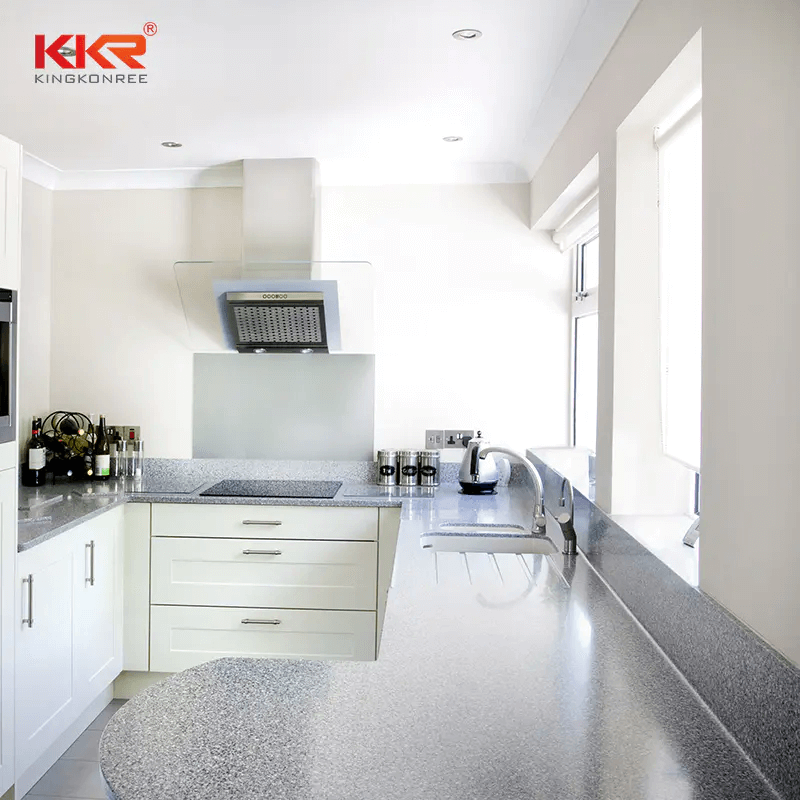
What is a Non-Porous Countertop?
To answer the FAQ “What is a non-porous surface?” “What are non-porous surfaces?” Non-porous countertops are countertops that do not absorb water or allow water to soak through them. Water can flow through tiny pores in a material, non-porous countertops are called non-porous because they do not contain pores through which water can flow.
Kitchen countertops see a lot of water every day, this is because almost all kitchen activities require water. While some countertops get soaked and can even be damaged by water, non-porous countertops will not allow water particles to go through. Instead, they allow water droplets to stay on their surface and dry, or drop to the floor.
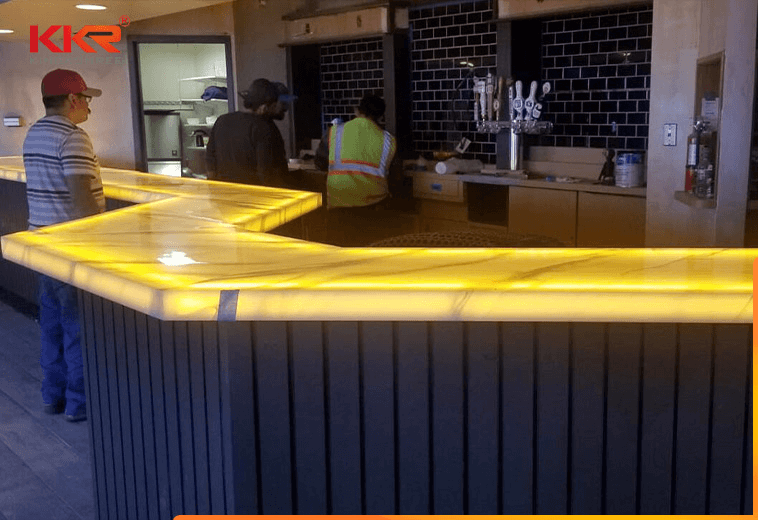
Why Choose a Non-Porous Countertop?
Non-porous materials should be considered for the following reasons – durability, aesthetics, bacterial and stain resistance, and the ease of cleaning the countertops.
Stain Resistance
Cases of accidentally toppling a glass of wine, hot coffee and other liquids with a dark color on the countertop happen, and the spills can leave a long-lasting stain on countertops.
Non-porous countertops are great for use in areas that are prone to stains. Since they are not permeable, stains can easily be wiped off the surface of the countertop.
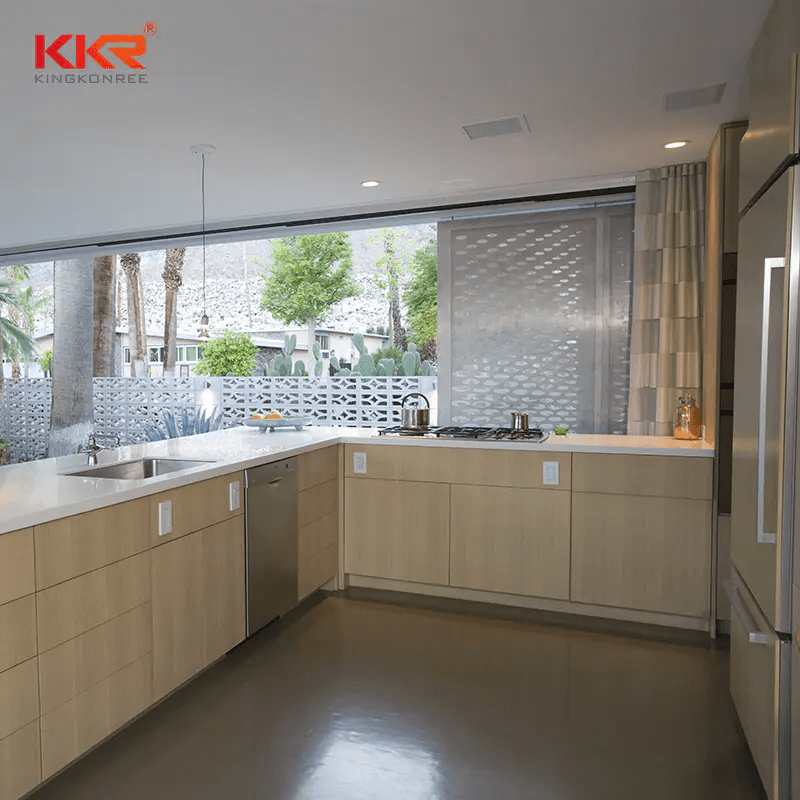
Bacterial Resistance
Moisture can aid the growth of bacteria and some microorganisms. This is why it is not uncommon to see algae grow on porous countertops.
Moistures favor the growth of bacteria. Nonporous materials simply do not allow the penetration of water or moisture through them, hence they are not favorable to the growth of bacteria. There is a reduced chance of combating the growth of mold, mildew, and bacteria in homes where they are used.
Ease of Cleaning and Maintenance
It’s no news that porous countertops are difficult to maintain. This is because they contain numerous tiny holes that absorb a great percentage of liquids, spillages, and moisture.
However, nonporous surfaces can be maintained and cleaned easily with no compromise on their quality. Although the maintenance of non-porous countertops depends on the materials they are made from, they are relatively easy to maintain.
Durability
Counters made of nonporous materials are also resistant to water which gives the user guarantee that the countertop cannot be easily damaged by water.
A porous countertop user is most likely going to get his countertop damaged by water and improper maintenance. But non-porous countertop users can easily maintain their countertops and increase their lifespan.
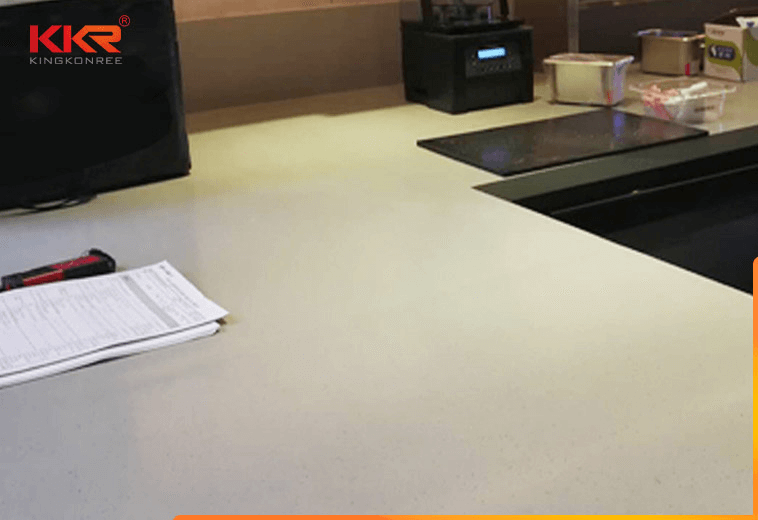
Best Types of Non-Porous Materials for Making Countertops
The best type of nonporous materials suitable for making the best non-porous countertops are solid surface, (Learn: What Is A Solid Surface Countertop) Quartz, and Stainless steel. And the characteristics of those materials will be introduced in this part.
Solid Surface
Solid-surface countertops are made from dense acrylic, polyester, and solid material like stone. Countertops made of solid surfaces are common in residential apartments and commercial properties because of their highly desirable qualities.
First, solid countertops are non-porous hence they do not allow water to pass through them. This property makes it suitable for spaces that see a fair share of liquid daily for example kitchen, and wash spaces. For instance, the KKR Bathroom Vanity Countertops is one of the best non-porous countertops available in the market.
Besides being nonporous, solid surface countertops are heat and impact resistant. This makes them can handle hot pots, stoves, and spills from hot drinks, as well as easily absorb the impacts without getting damaged.
Solid surfaces can be easily cut and shaped into custom products. They can also be designed to suit the aesthetics of the space they will be used.
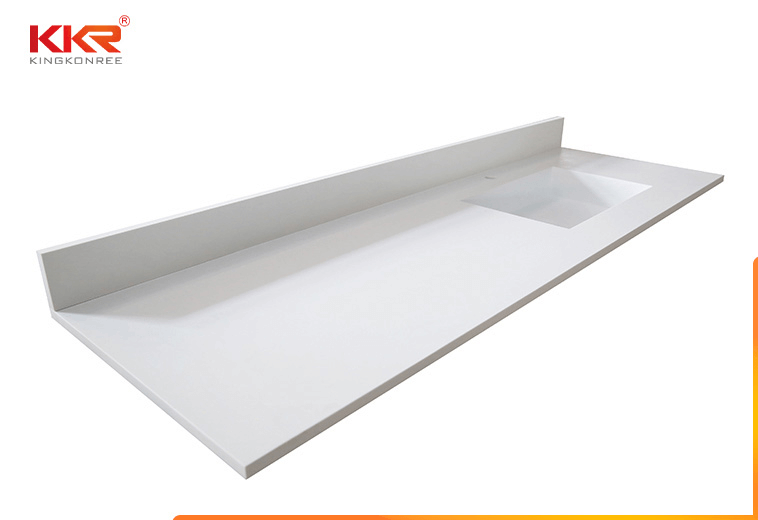
Quartz
Quartz can give the same luxury and aesthetic marble or granite will give a space. Quartz countertops are a low-cost substitute for high-end granite countertops. If you desire the look of marble or granite but don’t have the money, quartz is a great alternative.
Quartz is one of the most popular countertop materials in North America, maybe because they give an exquisite look to spaces while giving the user stress-free maintenance.
Unlike natural stone, this non-porous countertop does not need (Learn: How Much Countertop Overhang Do You Need) to be resealed. You don’t need to bother about topcoats or sealants because spills and any stains can simply be wiped off the surface.
Stainless Steel
Stainless steel countertops are popular in commercial kitchens as they are highly durable and can not be easily damaged by water, heat, stains, and corrosion.
They have a high resistance to these conditions. In addition, the smooth surface of this countertop makes it very easy to clean. Without stress, stains can be wiped off from the surface of a stainless steel countertop.
How to Choose a Non-Porous Countertop
There are several things to take into account while selecting a non-porous countertop. This includes the purpose the countertop is meant to serve, the materials used for the countertop, and the design and aesthetics of the space it will be fitted on.
Define the Requirements
While many of the non-porous countertops discussed are great, some are better for some requirements than others. For instance, if lots of impacts is required, stainless steel countertops can be a bit sonorous and can cause a little bit of noise pollution, whereas quartz and solid surfaces will handle the impact pretty well.
Also, if a moderate amount of heat is part of the requirement, a solid surface non-porous countertop is the most preferred. This is because stainless steel can absorb heat and become heated in the process, while solid surfaces do not get heated easily.
Research Materials
Before purchasing, choose several nonporous surfaces to compare their materials, the cons and pros of either solid surface, quartz, and stainless steel. It’s important to weigh in on all the aspects to see what you really want.
This will let you have a deeper knowledge of each material’s qualities and applicability for your project. You can also speak with countertop experts like KKR for more advice (Learn: Advice on the Best Restaurant Countertops) on several.
Consider Aesthetics and Design
Design and aesthetics are very important aspects in choosing countertops (Learn: Choosing Matte Countertops: Pros and Cons). The best countertop should be able to fit into the general design of the room without taking away from the aesthetics.
If it is difficult to get the right design, it is best to go for custom-made designs, to suit the design and aesthetics of the space perfectly.
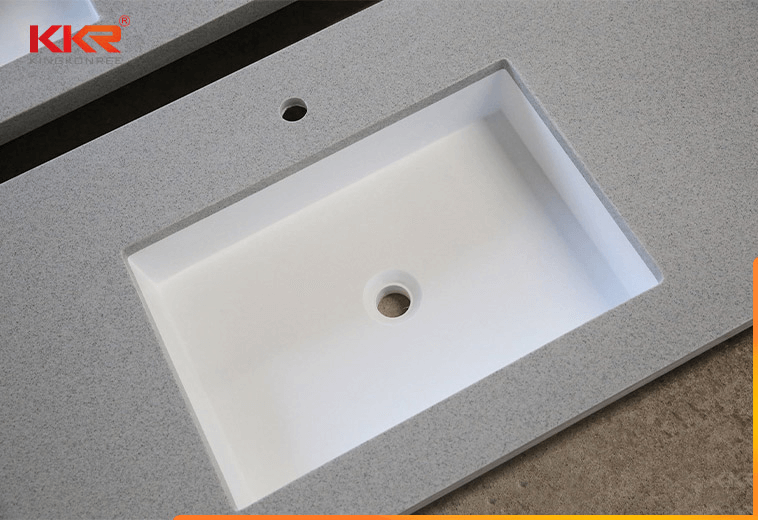
KKR: Reliable Manufacturer of Non-Porous Countertops
KKR started as a company that produced material panels in 2000. With two decades of experience under our belt, we have widened our market reach and served hundreds of business owners. Here’s why you should choose us.
Customize the Style of the Countertop
Getting the right style or design of countertops can be a hassle at times. Not to worry, KKR makes custom-made countertops that fit in perfectly with whatever our clients want. All of our clients have the liberty to customize their countertops. Whatever you design, we can produce it to taste.
Fast Production
We understand the importance of time and urgency to you, hence, we engage in fast countertop production that still retains its quality and aesthetics. You no longer have to wait a long time for our products to get to you, irrespective of your location.
Conclusion
Undoubtedly, we have answered the question “What is a non-porous surface” and provided answers to other necessary questions. Non-porous surfaces are durable, easy to clean, and resist bacteria. While these countertops are good, they should be chosen based on the design requirements, and aesthetics.
KKR can help you decide on what non-porous countertop to get, and at the same time produce a custom-made countertop to fit different requirements. Whatever your needs are, get in touch with us today!



